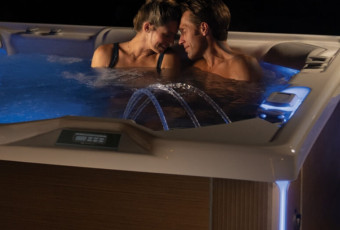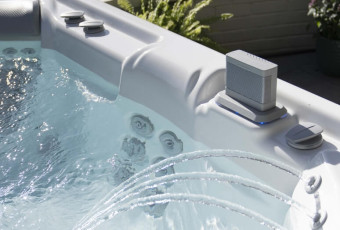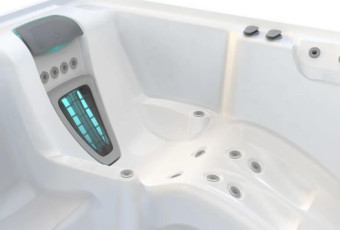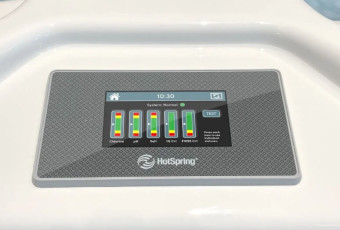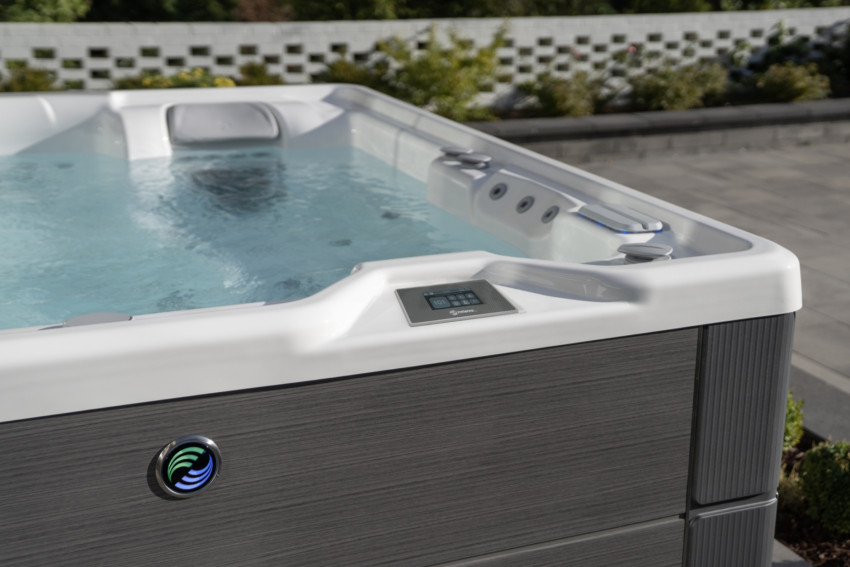Spa pools can be seen as a plus-size game of chemistry, where beakers are replaced by hot tubs. Any self-respecting spa pool owner will be chasing the best soaking experience possible, and spa water forms the core of that experience, able to make it or break it. As such, you’ll be looking to ensure you have the cleanest, clearest, softest and freshest spa pool water possible. Could ozone technology be the answer?
Ozone is a gas that smells like chlorine in its pure form, and that, like chlorine, is a powerful oxidant. This means that it can be used to sanitise your spa pool water in the same way that chlorine can. While most other manufacturers use UV technology to generate ozone, in a Hot Spring spa pool the ozone is generated using the corona discharge method, a far more robust and reliable option that uses electricity to break down air into its component parts, ozone being one.
But what exactly does ozone do to the water of your spa pool? How does it differ from chlorine? And should you choose a spa pool fitted with an ozone generator? In this article we’ll be looking at all those questions and more.
What is ozone in a spa pool?
Looking at the chemical formula for ozone – O3 – you’ll recognise the similarity to oxygen gas – O2 – the difference being that oxygen gas has one fewer oxygen atom. The result is that ozone is less stable than oxygen, and is generally converted into oxygen by the time it reaches the lower atmosphere.
Releasing the ozone from ambient air is a simple matter of applying electricity. This breaks down the air to its constituent parts, of which ozone is one. Corona discharge systems are capable of converting ambient air into ozone concentrations of 3-6%.
Why go to the bother of extracting ozone from the air and pumping it into your spa pool? As an efficient oxidiser, ozone is also an efficient sanitiser – the two go hand-in-hand. It is also an effective ‘flocculant’, which means it can make your water clearer. Finally, the byproduct of ozone’s oxidation process is oxygen: no harm, no smells, no worries.
How does ozone work?
As mentioned above, ozone is one of the most powerful oxidisers that we know of, and the process of oxidation is what chlorine uses to break down bacteria, fungi, viruses and other microorganisms. This process attacks lipids to break through the cell walls of the organism, and goes on to destroy the cell’s contents. Your spa pool filter system can then remove the disparate parts of the broken down contaminants, leaving your water nice and clean.
The efficiency, effectiveness and comparatively harmless nature of ozone has seen its use explode in the spa pool industry in recent decades.
Hot Spring’s Freshwater Ozone System is a prime example. This system uses corona discharge technology to continually generate and release up to 10x more ozone into your spa pool than equivalent UV ozone systems, sanitising the water and greatly reducing your reliance on chemicals.
Add in a splash of MPS chlorine-free oxidiser, and your spa pool water will be cleaner, fresher and brighter than you ever thought possible!

Can ozone damage a spa pool?
Ozone is an oxidiser, and oxidisers have the potential to be harmful to spa pools if used in the wrong way. When the concentration of spa ozone is too high, or if the ozone is concentrated in certain areas of the spa, it can cause damage to the shell and other exposed components.
Ozone spa systems therefore need to be expertly installed in order to work effectively, safely and in a way that doesn’t affect the longevity of your spa pool.
As leaders in spa pool innovation, at Hot Spring we have invested heavily in the research and development of our Freshwater Ozone System to ensure it ticks all the boxes above. We’ve been in business since 1980, and have seen many spa pool brands come and go over that time. If you’re looking for a spa pool with ozone, a Hot Spring will give you ultimate peace of mind.
Is Ozone in a spa pool harmful to the skin?
Spa pool ozone is a unique sanitiser, because unlike chlorine and bromine, it doesn’t cause skin irritation. Ozone is pulled out of thin air, and is harmless to humans when properly delivered by a spa ozone generator. It’s about as damaging to the skin as oxygen.
The only issues that ozone can cause are from breathing in high concentrations, but you’ll never get anywhere near those dangerous levels from an ozone generator in a spa pool.
Ozone technology has been used in spa pools for decades, and is every bit as safe as any other common spa pool chemicals, such as chlorine. In many ways, in fact, it’s quite a lot safer.
Do ozone hot tubs need chlorine?
It’s important to note that ozone generators aren’t designed to entirely replace spa pool chemicals like chlorine and bromine. They are instead designed to reduce your reliance on chemicals, making for less work, greater affordability, and a more comfortable soak.
Because ozone is a gas, it floats to the surface of your spa pool, and will only break down the contaminants that it happens to pass on its journey. Being soluble chemicals, chlorine and bromine still have a role to play, as they stay locked in the water ready to clean up the microorganisms that the ozone misses.

What is MPS and spa shock?
Earlier we mentioned that adding a splash of MPS can make your spa water clean, fresh and bright… but what is MPS?
Potassium monopersulfate, or MPS to its friends, is another oxidising agent often used in tandem with an ozone generator. While ozone is great at keeping spa pool water safe by killing unwanted invaders, MPS works to keep your spa pool water clear.
Like ozone, adding MPS to your water means that chlorine doesn’t need to work as hard. With MPS keeping the water bright and clear, chlorine is free to focus on oxidising the contaminants that the ozone system might have missed. It therefore further reduces your chlorine requirements, and because it’s pH neutral, MPS won’t affect the delicate chemical balance of your spa water.
MPS is sometimes called spa shock, as the results can indeed be shocking… in the best possible way. MPS is usually added 10 minutes before every soak, and turns the water bright, brilliant and perfectly clear.
What is the advantage of ozone compared to chlorine?
Oxidation, sanitisation, chemical structures… given the apparent similarities of ozone and chlorine, it can be tempting to ask which is better. But this would imply that you should choose one over the other, and the truth is that these compounds perform at their best when they work together.
Extracted from thin air, gentler on the skin, and lacking in odour, ozone seems the ideal sanitiser for a spa pool setting. It does have its limits however – as a gas that passes up through the waters of your spa pool, it fails to catch all the microorganisms that are constantly looking to infiltrate your spa.
Enter soluble chemicals like chlorine and bromine. These mix into the water, allowing them to seek out and neutralise the contaminants that ozone misses. Ozone will greatly reduce your reliance on traditional spa pool chemicals – particularly when paired with MPS – though for those not entirely convinced by ozone, the Hot Spring Freshwater® Salt System is a fantastic (and in some ways superior) alternative.
At the end of the day, ozone delivers a more comfortable soak, while also asking you to do less work and spend less money on spa pool chemicals. If you’re keen to hear more about how the Hot Spring Freshwater® Ozone System could enhance your spa pool experience, get in touch with our friendly team today!

